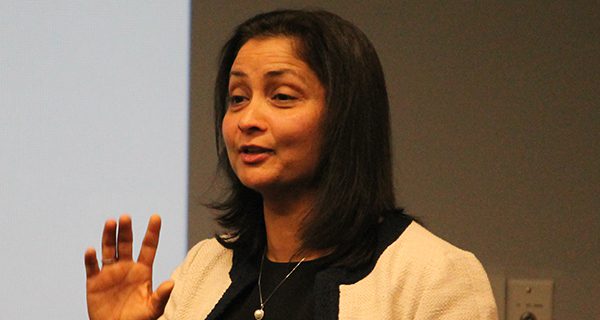[ccfic caption-text format="plaintext"]
On Thursday night inside the Wellesley Library, Dr. Justin Lacasse and Dr. Marini Prabhu spoke to a crowd of both laymen and medical professionals about dealing with a variety of mental health issues and navigating the tricky system to get help.
Lacasse presented “An Overview of Adult Depression and Anxiety: And Navigating the System to Obtain Help,” which both spoke of how to recognize mental health issues and acknowledged the difficulties in navigating the system to get help.
One of the things Lacasse spoke of was using training clinics, to seek help at a reduced rate. This idea is necessary because, as he noted, “more and more therapists aren’t taking insurance. We’re not providing enough incentives for them to remain in the system.”
Even if you have the finances to seek help, knowing who to talk to can be an issue. There are so many different names for professionals that help people with their mental health, that often people aren’t sure who to seek help from, or who is helping them if they’re in the midst of treatment.
“You hear people saying, ‘my therapist prescribed me medication’” Lacasse explained, “in that case, they mean their psychiatrist.”
And even though “The vast majority of people with stress and anxiety could really be helped with counseling,” many people have no idea what that would entail. For example, Lacasse explained that the the traditional treatments most people think of, like lying on a couch and analyzing dreams or talking about one's mother, has largely disappeared in favor of cognitive behavioral therapy.
To demonstrate why these issues are of such great importance, Lacasse threw some disturbing numbers at the crowd. 9 million people a year meet the criteria for clinical depression, and depression is estimated to cost the US economy fifty billion dollars a year. Over 40,000 people a year die of suicide, and while we think of it as a teen problem, 20 percent of all suicides are people 65 and older.

Dr. Lacasse fields a question about the role mindfulness can play in dealing with depression. Photos by James Kinneen
But there is still a stigma that surrounds depression, which Lacasse fought against.
“We would never tell someone with diabetes to just snap out of it,” he explained.
And if you’re afraid that you’re not anxious enough to see help for your anxiety, or that you would come off as weak for doing so, Lacasse laid out this simple advice.
“With anxiety, there’s sort [of] a problem anytime you feel there’s a problem.”
Dr. Malini Prabhu echoed this idea when she talked about stress. As an assistant clinical professor at Tufts Medical, she deals with many students and has to talk to them about the difference between “optimum stress” - the natural stress one should feel that is helpful - and stress that can be destructive.
She noted that students tend to develop unhealthy coping mechanisms, like drinking and partying, and talked about the effect social media has on increased stress and anxiety levels.
Because of her background in teaching the younger generation, she used several Buzzfeed style listicles to help people remember the most important points she addressed. Her “five things you need to remember about stress” were that it affects everyone, not all stress is bad, long term stress can harm your health, there are many ways to manage it, and that if you are overwhelmed by it, you should seek help from a professional.
Regarding maternal depression, Prabhu was very clear about the idea that “with treatment, maternal depression is a temporary health problem unlike regular depression. Her “five things you need to know about maternal depression” included that it’s common, there are many possible symptoms, it can occur during pregnancy up to a year after birth, it’s not your fault, and that you should seek help sooner rather than later.
Various treatments were discussed during the Q and A period, with marijuana and other “natural” cures like St. John's wort coming up, to which each doctor questioned the efficacy of both, void of clinical studies showing great results. Instead, they pushed the more conventional treatments: exercise, getting more sunlight, increasing mindfulness, as well as making sure there are no other issues, like an underactive thyroid causing problems.

























